Child Health Factors in Nigeria
VerifiedAdded on 2020/02/05
|13
|3154
|46
Presentation
AI Summary
This assignment involves a presentation and essay focusing on child health in Nigeria. Students will critically discuss various factors influencing child health, including political, economic, environmental, religious, and cultural aspects. The presentation will last 15 minutes, followed by a Q&A session, while the essay will require a detailed analysis of the health issues faced by children in Nigeria and the impact on their development. Research and policy documents will be discussed to support the analysis.
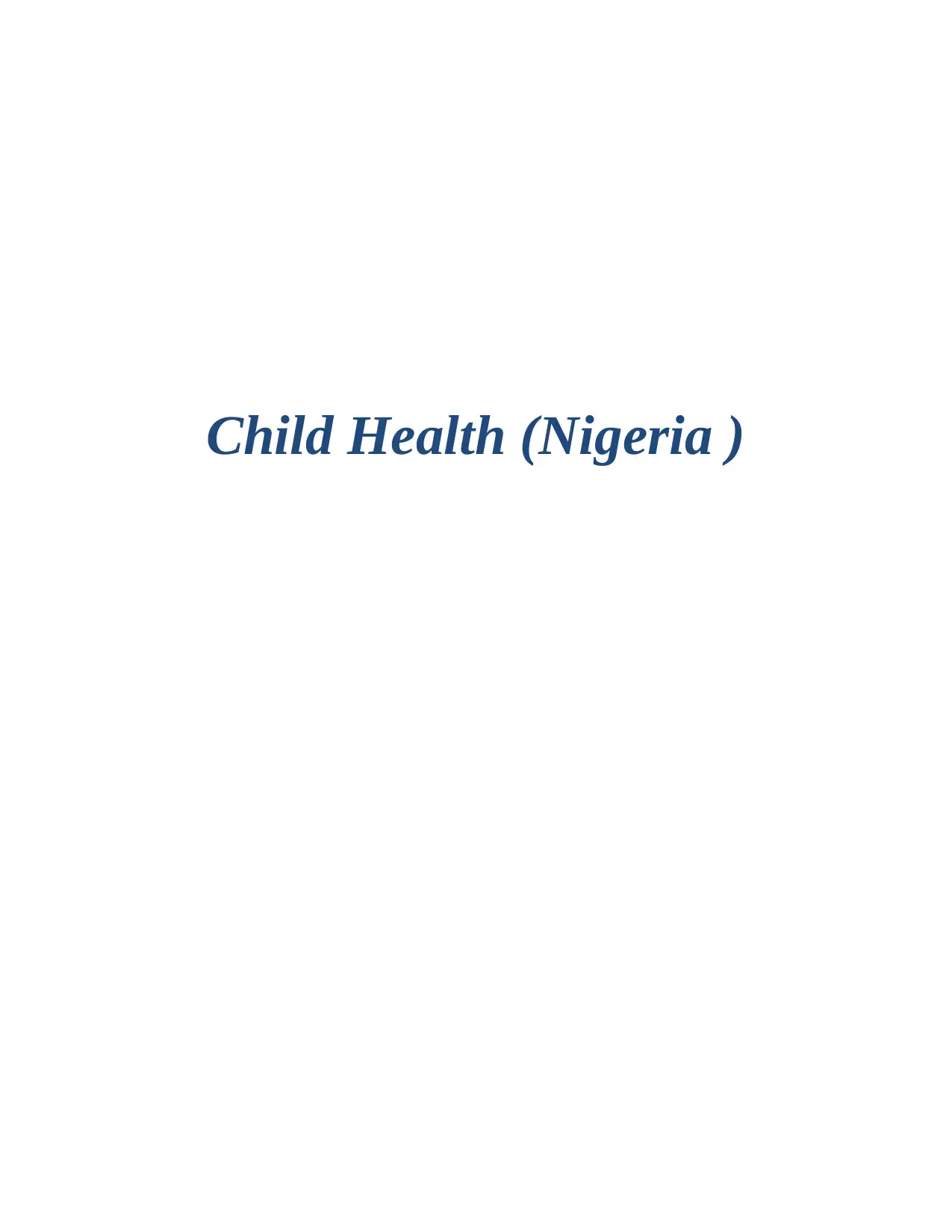
Child Health (Nigeria )
Paraphrase This Document
Need a fresh take? Get an instant paraphrase of this document with our AI Paraphraser
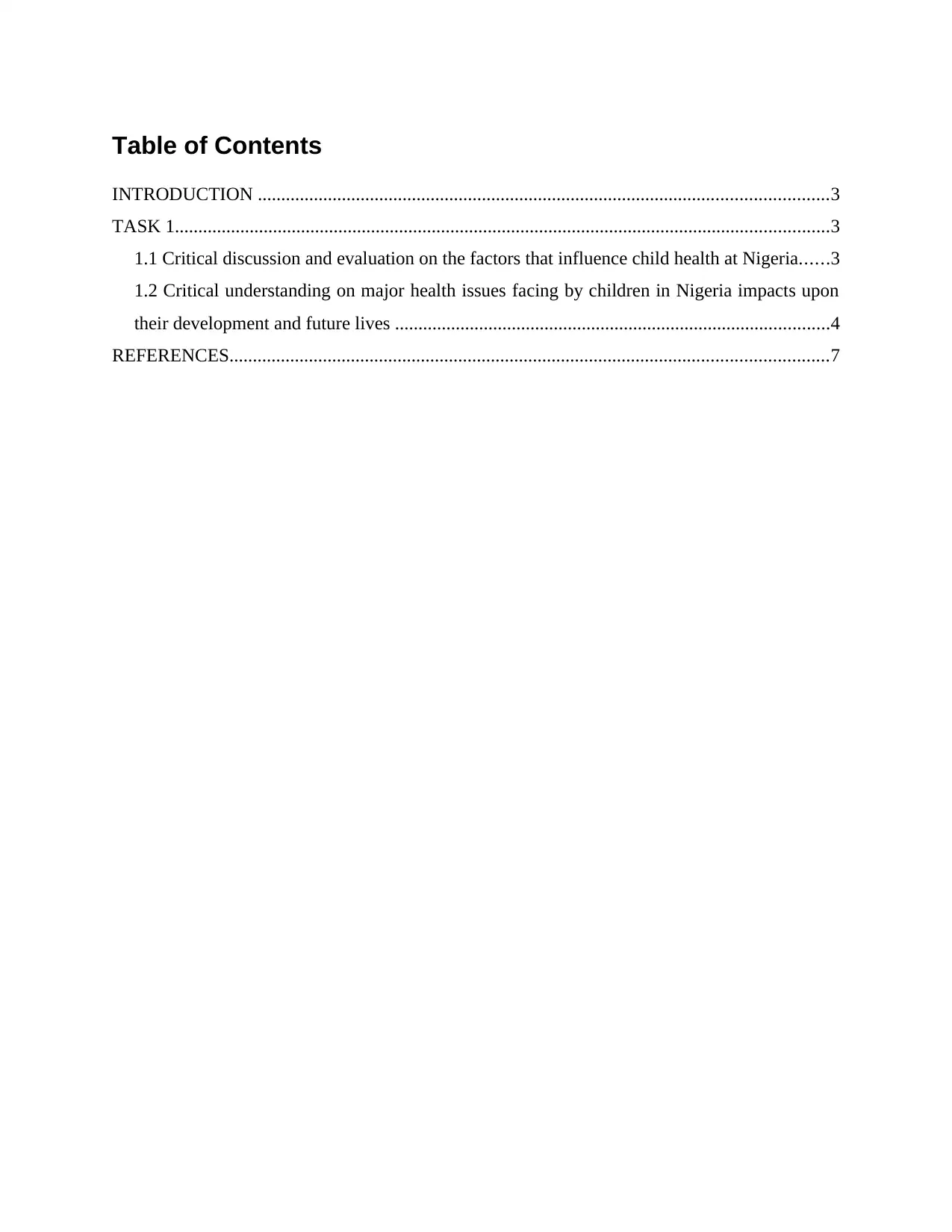
Table of Contents
INTRODUCTION ..........................................................................................................................3
TASK 1............................................................................................................................................3
1.1 Critical discussion and evaluation on the factors that influence child health at Nigeria......3
1.2 Critical understanding on major health issues facing by children in Nigeria impacts upon
their development and future lives .............................................................................................4
REFERENCES................................................................................................................................7
INTRODUCTION ..........................................................................................................................3
TASK 1............................................................................................................................................3
1.1 Critical discussion and evaluation on the factors that influence child health at Nigeria......3
1.2 Critical understanding on major health issues facing by children in Nigeria impacts upon
their development and future lives .............................................................................................4
REFERENCES................................................................................................................................7
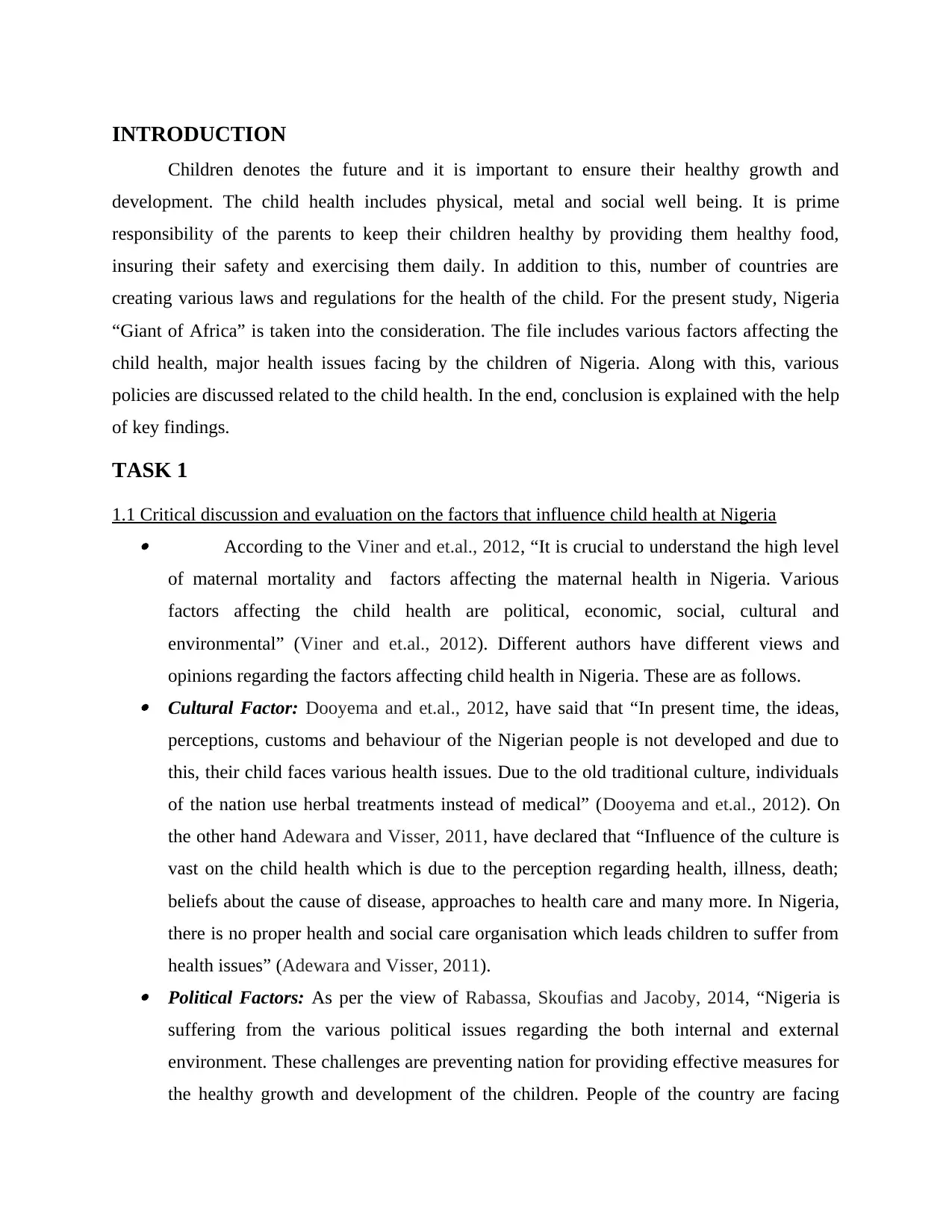
INTRODUCTION
Children denotes the future and it is important to ensure their healthy growth and
development. The child health includes physical, metal and social well being. It is prime
responsibility of the parents to keep their children healthy by providing them healthy food,
insuring their safety and exercising them daily. In addition to this, number of countries are
creating various laws and regulations for the health of the child. For the present study, Nigeria
“Giant of Africa” is taken into the consideration. The file includes various factors affecting the
child health, major health issues facing by the children of Nigeria. Along with this, various
policies are discussed related to the child health. In the end, conclusion is explained with the help
of key findings.
TASK 1
1.1 Critical discussion and evaluation on the factors that influence child health at Nigeria According to the Viner and et.al., 2012, “It is crucial to understand the high level
of maternal mortality and factors affecting the maternal health in Nigeria. Various
factors affecting the child health are political, economic, social, cultural and
environmental” (Viner and et.al., 2012). Different authors have different views and
opinions regarding the factors affecting child health in Nigeria. These are as follows. Cultural Factor: Dooyema and et.al., 2012, have said that “In present time, the ideas,
perceptions, customs and behaviour of the Nigerian people is not developed and due to
this, their child faces various health issues. Due to the old traditional culture, individuals
of the nation use herbal treatments instead of medical” (Dooyema and et.al., 2012). On
the other hand Adewara and Visser, 2011, have declared that “Influence of the culture is
vast on the child health which is due to the perception regarding health, illness, death;
beliefs about the cause of disease, approaches to health care and many more. In Nigeria,
there is no proper health and social care organisation which leads children to suffer from
health issues” (Adewara and Visser, 2011). Political Factors: As per the view of Rabassa, Skoufias and Jacoby, 2014, “Nigeria is
suffering from the various political issues regarding the both internal and external
environment. These challenges are preventing nation for providing effective measures for
the healthy growth and development of the children. People of the country are facing
Children denotes the future and it is important to ensure their healthy growth and
development. The child health includes physical, metal and social well being. It is prime
responsibility of the parents to keep their children healthy by providing them healthy food,
insuring their safety and exercising them daily. In addition to this, number of countries are
creating various laws and regulations for the health of the child. For the present study, Nigeria
“Giant of Africa” is taken into the consideration. The file includes various factors affecting the
child health, major health issues facing by the children of Nigeria. Along with this, various
policies are discussed related to the child health. In the end, conclusion is explained with the help
of key findings.
TASK 1
1.1 Critical discussion and evaluation on the factors that influence child health at Nigeria According to the Viner and et.al., 2012, “It is crucial to understand the high level
of maternal mortality and factors affecting the maternal health in Nigeria. Various
factors affecting the child health are political, economic, social, cultural and
environmental” (Viner and et.al., 2012). Different authors have different views and
opinions regarding the factors affecting child health in Nigeria. These are as follows. Cultural Factor: Dooyema and et.al., 2012, have said that “In present time, the ideas,
perceptions, customs and behaviour of the Nigerian people is not developed and due to
this, their child faces various health issues. Due to the old traditional culture, individuals
of the nation use herbal treatments instead of medical” (Dooyema and et.al., 2012). On
the other hand Adewara and Visser, 2011, have declared that “Influence of the culture is
vast on the child health which is due to the perception regarding health, illness, death;
beliefs about the cause of disease, approaches to health care and many more. In Nigeria,
there is no proper health and social care organisation which leads children to suffer from
health issues” (Adewara and Visser, 2011). Political Factors: As per the view of Rabassa, Skoufias and Jacoby, 2014, “Nigeria is
suffering from the various political issues regarding the both internal and external
environment. These challenges are preventing nation for providing effective measures for
the healthy growth and development of the children. People of the country are facing
⊘ This is a preview!⊘
Do you want full access?
Subscribe today to unlock all pages.

Trusted by 1+ million students worldwide
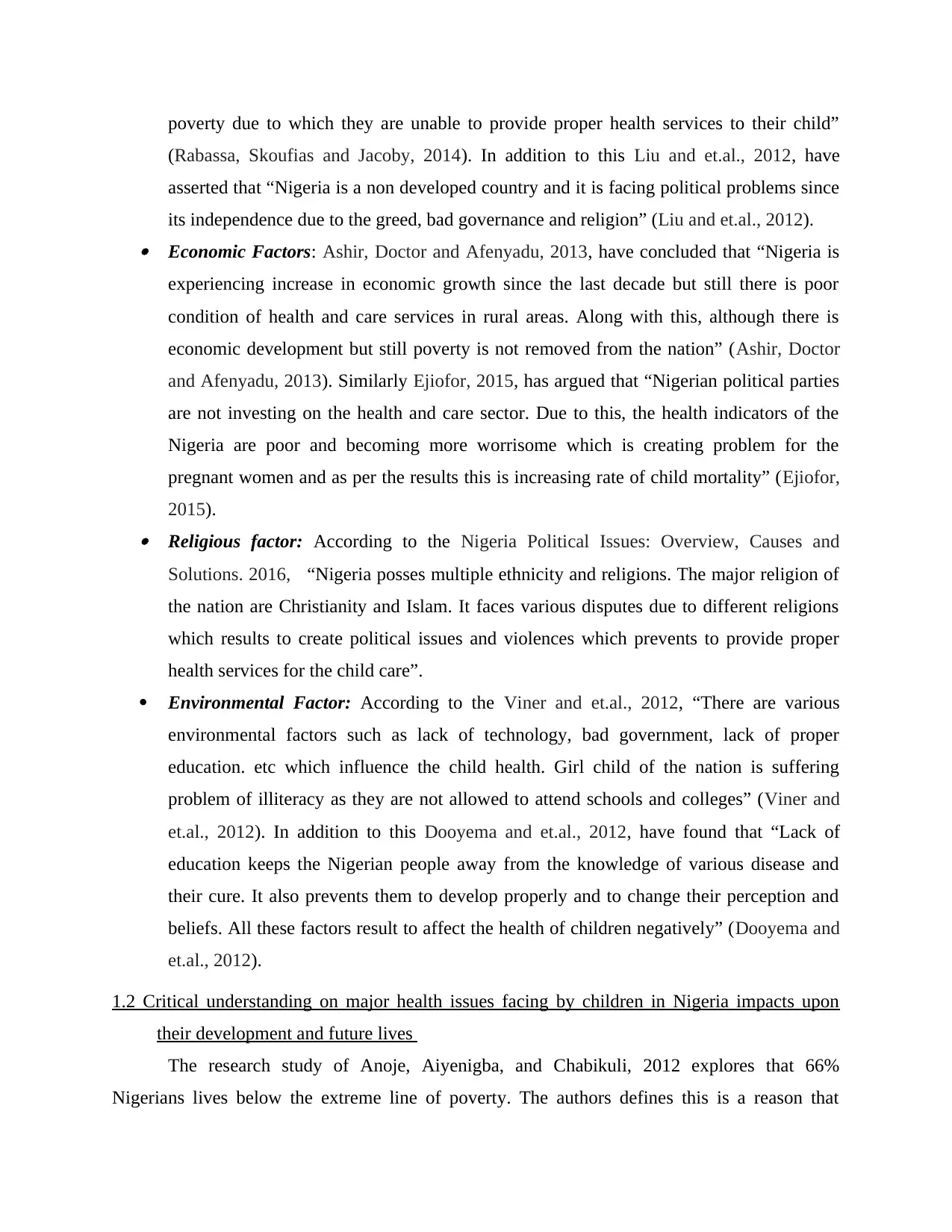
poverty due to which they are unable to provide proper health services to their child”
(Rabassa, Skoufias and Jacoby, 2014). In addition to this Liu and et.al., 2012, have
asserted that “Nigeria is a non developed country and it is facing political problems since
its independence due to the greed, bad governance and religion” (Liu and et.al., 2012). Economic Factors: Ashir, Doctor and Afenyadu, 2013, have concluded that “Nigeria is
experiencing increase in economic growth since the last decade but still there is poor
condition of health and care services in rural areas. Along with this, although there is
economic development but still poverty is not removed from the nation” (Ashir, Doctor
and Afenyadu, 2013). Similarly Ejiofor, 2015, has argued that “Nigerian political parties
are not investing on the health and care sector. Due to this, the health indicators of the
Nigeria are poor and becoming more worrisome which is creating problem for the
pregnant women and as per the results this is increasing rate of child mortality” (Ejiofor,
2015). Religious factor: According to the Nigeria Political Issues: Overview, Causes and
Solutions. 2016, “Nigeria posses multiple ethnicity and religions. The major religion of
the nation are Christianity and Islam. It faces various disputes due to different religions
which results to create political issues and violences which prevents to provide proper
health services for the child care”.
Environmental Factor: According to the Viner and et.al., 2012, “There are various
environmental factors such as lack of technology, bad government, lack of proper
education. etc which influence the child health. Girl child of the nation is suffering
problem of illiteracy as they are not allowed to attend schools and colleges” (Viner and
et.al., 2012). In addition to this Dooyema and et.al., 2012, have found that “Lack of
education keeps the Nigerian people away from the knowledge of various disease and
their cure. It also prevents them to develop properly and to change their perception and
beliefs. All these factors result to affect the health of children negatively” (Dooyema and
et.al., 2012).
1.2 Critical understanding on major health issues facing by children in Nigeria impacts upon
their development and future lives
The research study of Anoje, Aiyenigba, and Chabikuli, 2012 explores that 66%
Nigerians lives below the extreme line of poverty. The authors defines this is a reason that
(Rabassa, Skoufias and Jacoby, 2014). In addition to this Liu and et.al., 2012, have
asserted that “Nigeria is a non developed country and it is facing political problems since
its independence due to the greed, bad governance and religion” (Liu and et.al., 2012). Economic Factors: Ashir, Doctor and Afenyadu, 2013, have concluded that “Nigeria is
experiencing increase in economic growth since the last decade but still there is poor
condition of health and care services in rural areas. Along with this, although there is
economic development but still poverty is not removed from the nation” (Ashir, Doctor
and Afenyadu, 2013). Similarly Ejiofor, 2015, has argued that “Nigerian political parties
are not investing on the health and care sector. Due to this, the health indicators of the
Nigeria are poor and becoming more worrisome which is creating problem for the
pregnant women and as per the results this is increasing rate of child mortality” (Ejiofor,
2015). Religious factor: According to the Nigeria Political Issues: Overview, Causes and
Solutions. 2016, “Nigeria posses multiple ethnicity and religions. The major religion of
the nation are Christianity and Islam. It faces various disputes due to different religions
which results to create political issues and violences which prevents to provide proper
health services for the child care”.
Environmental Factor: According to the Viner and et.al., 2012, “There are various
environmental factors such as lack of technology, bad government, lack of proper
education. etc which influence the child health. Girl child of the nation is suffering
problem of illiteracy as they are not allowed to attend schools and colleges” (Viner and
et.al., 2012). In addition to this Dooyema and et.al., 2012, have found that “Lack of
education keeps the Nigerian people away from the knowledge of various disease and
their cure. It also prevents them to develop properly and to change their perception and
beliefs. All these factors result to affect the health of children negatively” (Dooyema and
et.al., 2012).
1.2 Critical understanding on major health issues facing by children in Nigeria impacts upon
their development and future lives
The research study of Anoje, Aiyenigba, and Chabikuli, 2012 explores that 66%
Nigerians lives below the extreme line of poverty. The authors defines this is a reason that
Paraphrase This Document
Need a fresh take? Get an instant paraphrase of this document with our AI Paraphraser
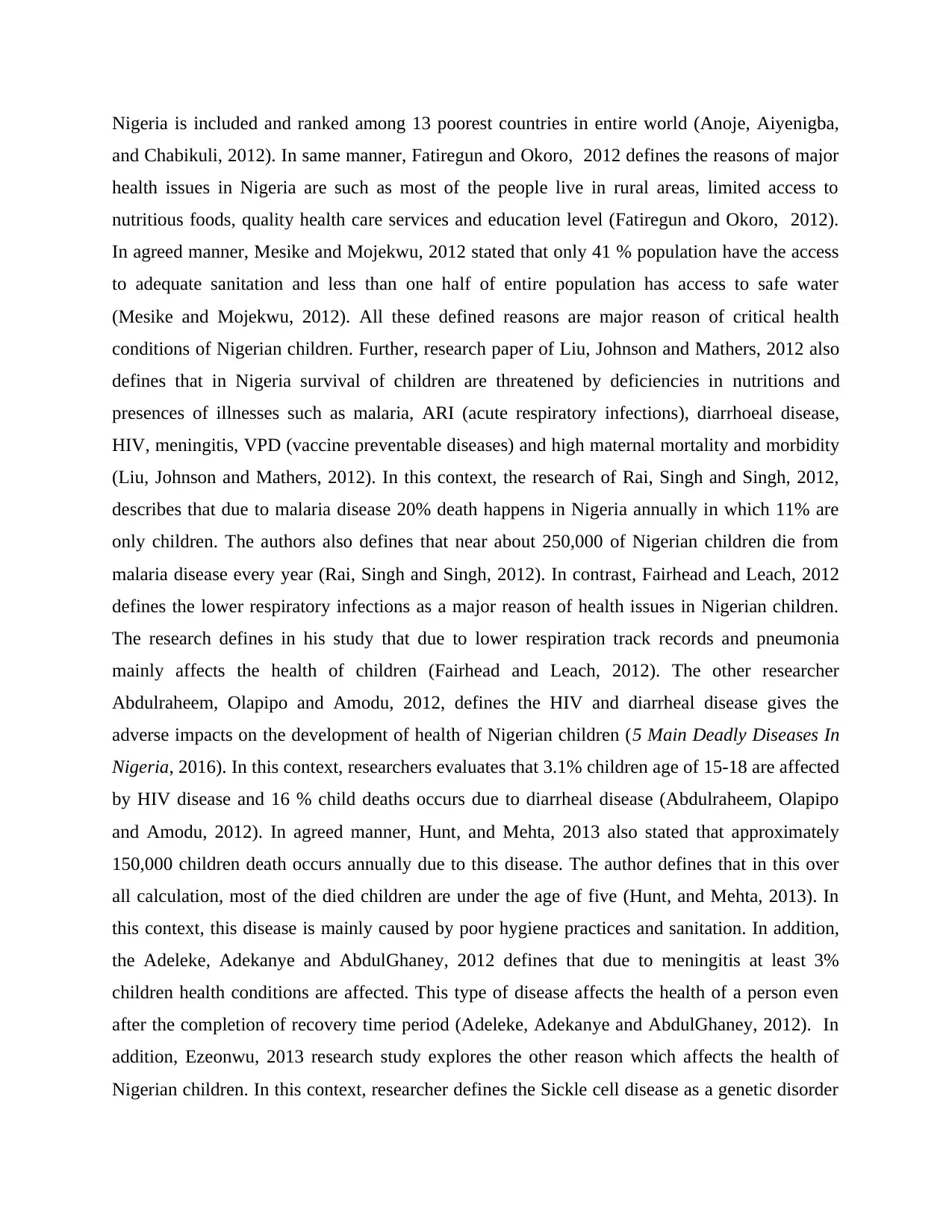
Nigeria is included and ranked among 13 poorest countries in entire world (Anoje, Aiyenigba,
and Chabikuli, 2012). In same manner, Fatiregun and Okoro, 2012 defines the reasons of major
health issues in Nigeria are such as most of the people live in rural areas, limited access to
nutritious foods, quality health care services and education level (Fatiregun and Okoro, 2012).
In agreed manner, Mesike and Mojekwu, 2012 stated that only 41 % population have the access
to adequate sanitation and less than one half of entire population has access to safe water
(Mesike and Mojekwu, 2012). All these defined reasons are major reason of critical health
conditions of Nigerian children. Further, research paper of Liu, Johnson and Mathers, 2012 also
defines that in Nigeria survival of children are threatened by deficiencies in nutritions and
presences of illnesses such as malaria, ARI (acute respiratory infections), diarrhoeal disease,
HIV, meningitis, VPD (vaccine preventable diseases) and high maternal mortality and morbidity
(Liu, Johnson and Mathers, 2012). In this context, the research of Rai, Singh and Singh, 2012,
describes that due to malaria disease 20% death happens in Nigeria annually in which 11% are
only children. The authors also defines that near about 250,000 of Nigerian children die from
malaria disease every year (Rai, Singh and Singh, 2012). In contrast, Fairhead and Leach, 2012
defines the lower respiratory infections as a major reason of health issues in Nigerian children.
The research defines in his study that due to lower respiration track records and pneumonia
mainly affects the health of children (Fairhead and Leach, 2012). The other researcher
Abdulraheem, Olapipo and Amodu, 2012, defines the HIV and diarrheal disease gives the
adverse impacts on the development of health of Nigerian children (5 Main Deadly Diseases In
Nigeria, 2016). In this context, researchers evaluates that 3.1% children age of 15-18 are affected
by HIV disease and 16 % child deaths occurs due to diarrheal disease (Abdulraheem, Olapipo
and Amodu, 2012). In agreed manner, Hunt, and Mehta, 2013 also stated that approximately
150,000 children death occurs annually due to this disease. The author defines that in this over
all calculation, most of the died children are under the age of five (Hunt, and Mehta, 2013). In
this context, this disease is mainly caused by poor hygiene practices and sanitation. In addition,
the Adeleke, Adekanye and AbdulGhaney, 2012 defines that due to meningitis at least 3%
children health conditions are affected. This type of disease affects the health of a person even
after the completion of recovery time period (Adeleke, Adekanye and AbdulGhaney, 2012). In
addition, Ezeonwu, 2013 research study explores the other reason which affects the health of
Nigerian children. In this context, researcher defines the Sickle cell disease as a genetic disorder
and Chabikuli, 2012). In same manner, Fatiregun and Okoro, 2012 defines the reasons of major
health issues in Nigeria are such as most of the people live in rural areas, limited access to
nutritious foods, quality health care services and education level (Fatiregun and Okoro, 2012).
In agreed manner, Mesike and Mojekwu, 2012 stated that only 41 % population have the access
to adequate sanitation and less than one half of entire population has access to safe water
(Mesike and Mojekwu, 2012). All these defined reasons are major reason of critical health
conditions of Nigerian children. Further, research paper of Liu, Johnson and Mathers, 2012 also
defines that in Nigeria survival of children are threatened by deficiencies in nutritions and
presences of illnesses such as malaria, ARI (acute respiratory infections), diarrhoeal disease,
HIV, meningitis, VPD (vaccine preventable diseases) and high maternal mortality and morbidity
(Liu, Johnson and Mathers, 2012). In this context, the research of Rai, Singh and Singh, 2012,
describes that due to malaria disease 20% death happens in Nigeria annually in which 11% are
only children. The authors also defines that near about 250,000 of Nigerian children die from
malaria disease every year (Rai, Singh and Singh, 2012). In contrast, Fairhead and Leach, 2012
defines the lower respiratory infections as a major reason of health issues in Nigerian children.
The research defines in his study that due to lower respiration track records and pneumonia
mainly affects the health of children (Fairhead and Leach, 2012). The other researcher
Abdulraheem, Olapipo and Amodu, 2012, defines the HIV and diarrheal disease gives the
adverse impacts on the development of health of Nigerian children (5 Main Deadly Diseases In
Nigeria, 2016). In this context, researchers evaluates that 3.1% children age of 15-18 are affected
by HIV disease and 16 % child deaths occurs due to diarrheal disease (Abdulraheem, Olapipo
and Amodu, 2012). In agreed manner, Hunt, and Mehta, 2013 also stated that approximately
150,000 children death occurs annually due to this disease. The author defines that in this over
all calculation, most of the died children are under the age of five (Hunt, and Mehta, 2013). In
this context, this disease is mainly caused by poor hygiene practices and sanitation. In addition,
the Adeleke, Adekanye and AbdulGhaney, 2012 defines that due to meningitis at least 3%
children health conditions are affected. This type of disease affects the health of a person even
after the completion of recovery time period (Adeleke, Adekanye and AbdulGhaney, 2012). In
addition, Ezeonwu, 2013 research study explores the other reason which affects the health of
Nigerian children. In this context, researcher defines the Sickle cell disease as a genetic disorder
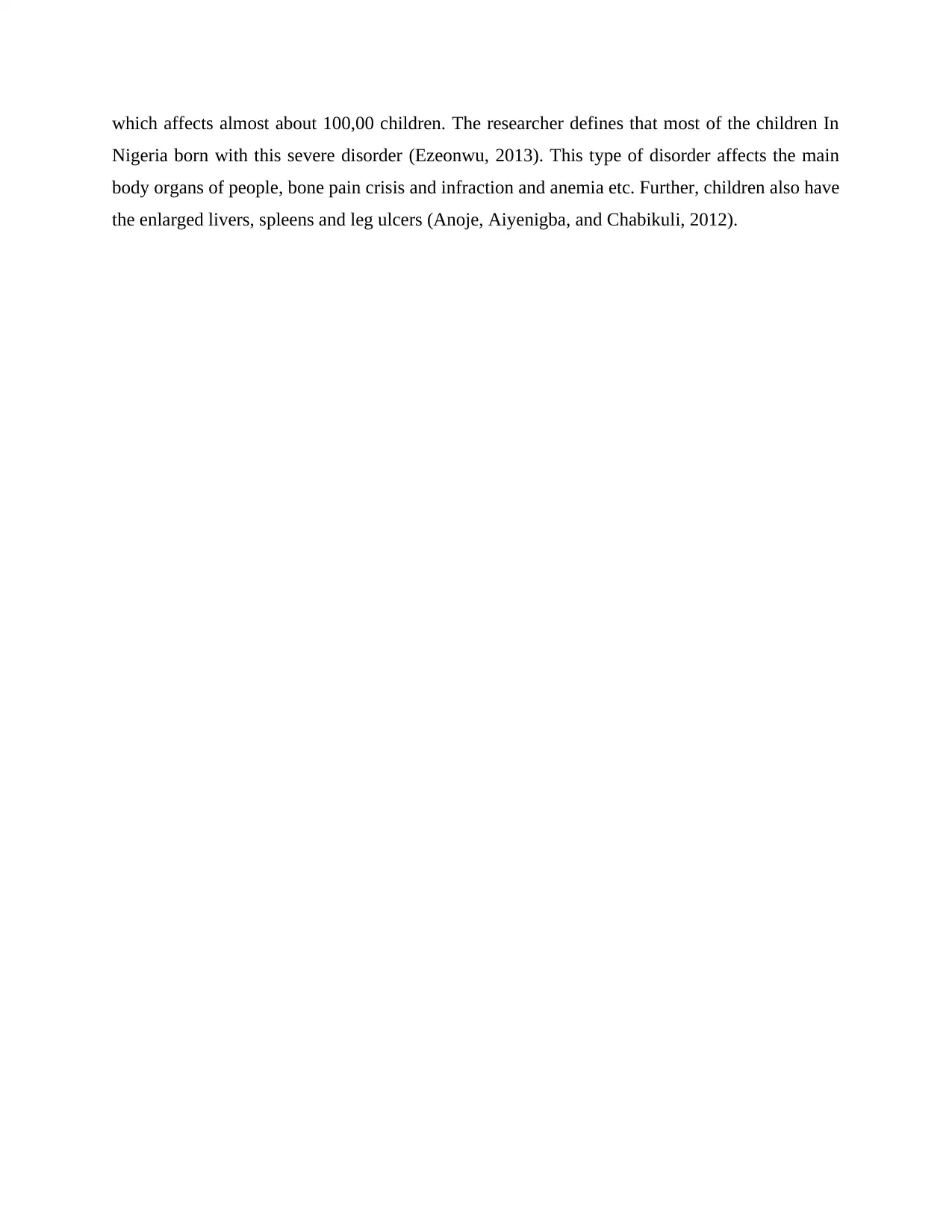
which affects almost about 100,00 children. The researcher defines that most of the children In
Nigeria born with this severe disorder (Ezeonwu, 2013). This type of disorder affects the main
body organs of people, bone pain crisis and infraction and anemia etc. Further, children also have
the enlarged livers, spleens and leg ulcers (Anoje, Aiyenigba, and Chabikuli, 2012).
Nigeria born with this severe disorder (Ezeonwu, 2013). This type of disorder affects the main
body organs of people, bone pain crisis and infraction and anemia etc. Further, children also have
the enlarged livers, spleens and leg ulcers (Anoje, Aiyenigba, and Chabikuli, 2012).
⊘ This is a preview!⊘
Do you want full access?
Subscribe today to unlock all pages.

Trusted by 1+ million students worldwide
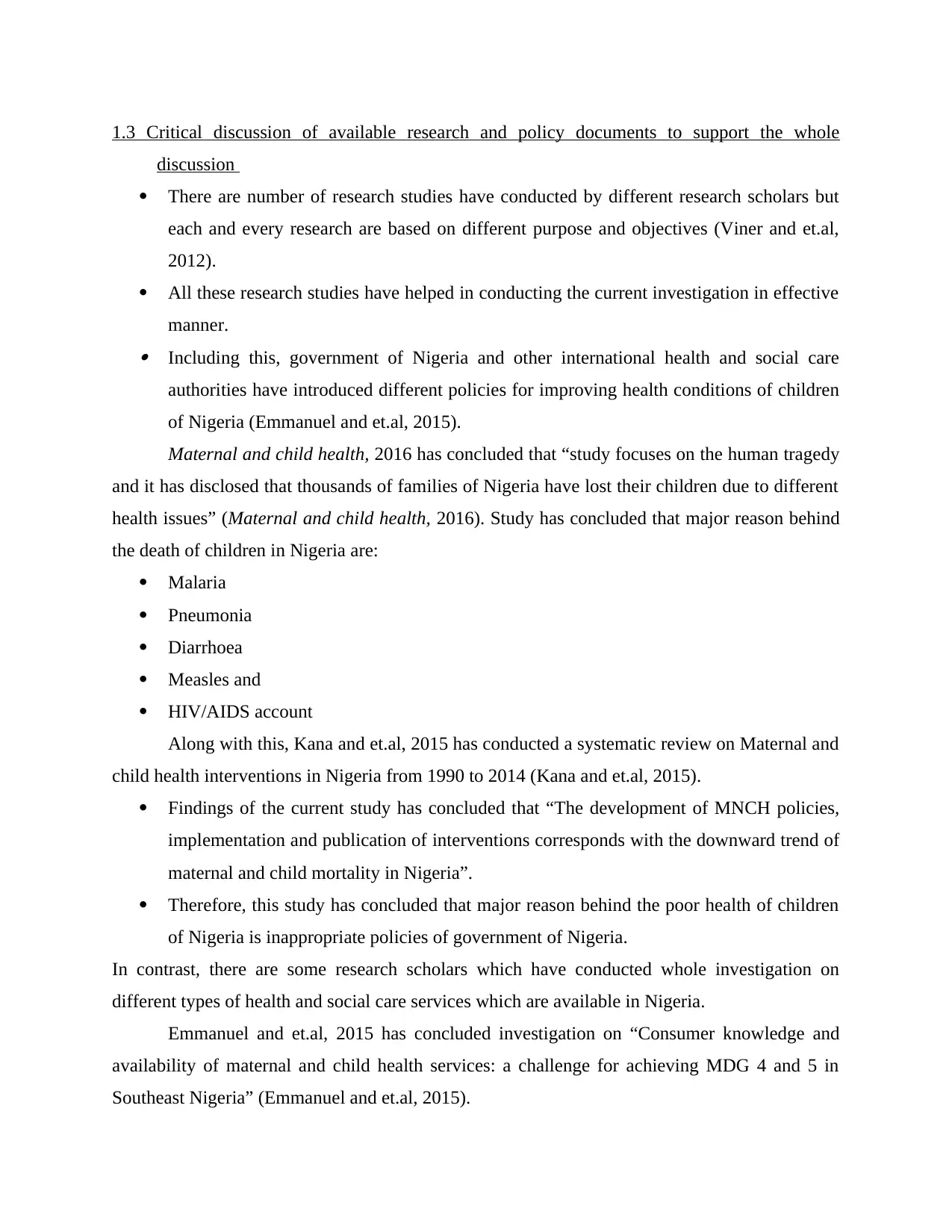
1.3 Critical discussion of available research and policy documents to support the whole
discussion
There are number of research studies have conducted by different research scholars but
each and every research are based on different purpose and objectives (Viner and et.al,
2012).
All these research studies have helped in conducting the current investigation in effective
manner. Including this, government of Nigeria and other international health and social care
authorities have introduced different policies for improving health conditions of children
of Nigeria (Emmanuel and et.al, 2015).
Maternal and child health, 2016 has concluded that “study focuses on the human tragedy
and it has disclosed that thousands of families of Nigeria have lost their children due to different
health issues” (Maternal and child health, 2016). Study has concluded that major reason behind
the death of children in Nigeria are:
Malaria
Pneumonia
Diarrhoea
Measles and
HIV/AIDS account
Along with this, Kana and et.al, 2015 has conducted a systematic review on Maternal and
child health interventions in Nigeria from 1990 to 2014 (Kana and et.al, 2015).
Findings of the current study has concluded that “The development of MNCH policies,
implementation and publication of interventions corresponds with the downward trend of
maternal and child mortality in Nigeria”.
Therefore, this study has concluded that major reason behind the poor health of children
of Nigeria is inappropriate policies of government of Nigeria.
In contrast, there are some research scholars which have conducted whole investigation on
different types of health and social care services which are available in Nigeria.
Emmanuel and et.al, 2015 has concluded investigation on “Consumer knowledge and
availability of maternal and child health services: a challenge for achieving MDG 4 and 5 in
Southeast Nigeria” (Emmanuel and et.al, 2015).
discussion
There are number of research studies have conducted by different research scholars but
each and every research are based on different purpose and objectives (Viner and et.al,
2012).
All these research studies have helped in conducting the current investigation in effective
manner. Including this, government of Nigeria and other international health and social care
authorities have introduced different policies for improving health conditions of children
of Nigeria (Emmanuel and et.al, 2015).
Maternal and child health, 2016 has concluded that “study focuses on the human tragedy
and it has disclosed that thousands of families of Nigeria have lost their children due to different
health issues” (Maternal and child health, 2016). Study has concluded that major reason behind
the death of children in Nigeria are:
Malaria
Pneumonia
Diarrhoea
Measles and
HIV/AIDS account
Along with this, Kana and et.al, 2015 has conducted a systematic review on Maternal and
child health interventions in Nigeria from 1990 to 2014 (Kana and et.al, 2015).
Findings of the current study has concluded that “The development of MNCH policies,
implementation and publication of interventions corresponds with the downward trend of
maternal and child mortality in Nigeria”.
Therefore, this study has concluded that major reason behind the poor health of children
of Nigeria is inappropriate policies of government of Nigeria.
In contrast, there are some research scholars which have conducted whole investigation on
different types of health and social care services which are available in Nigeria.
Emmanuel and et.al, 2015 has concluded investigation on “Consumer knowledge and
availability of maternal and child health services: a challenge for achieving MDG 4 and 5 in
Southeast Nigeria” (Emmanuel and et.al, 2015).
Paraphrase This Document
Need a fresh take? Get an instant paraphrase of this document with our AI Paraphraser
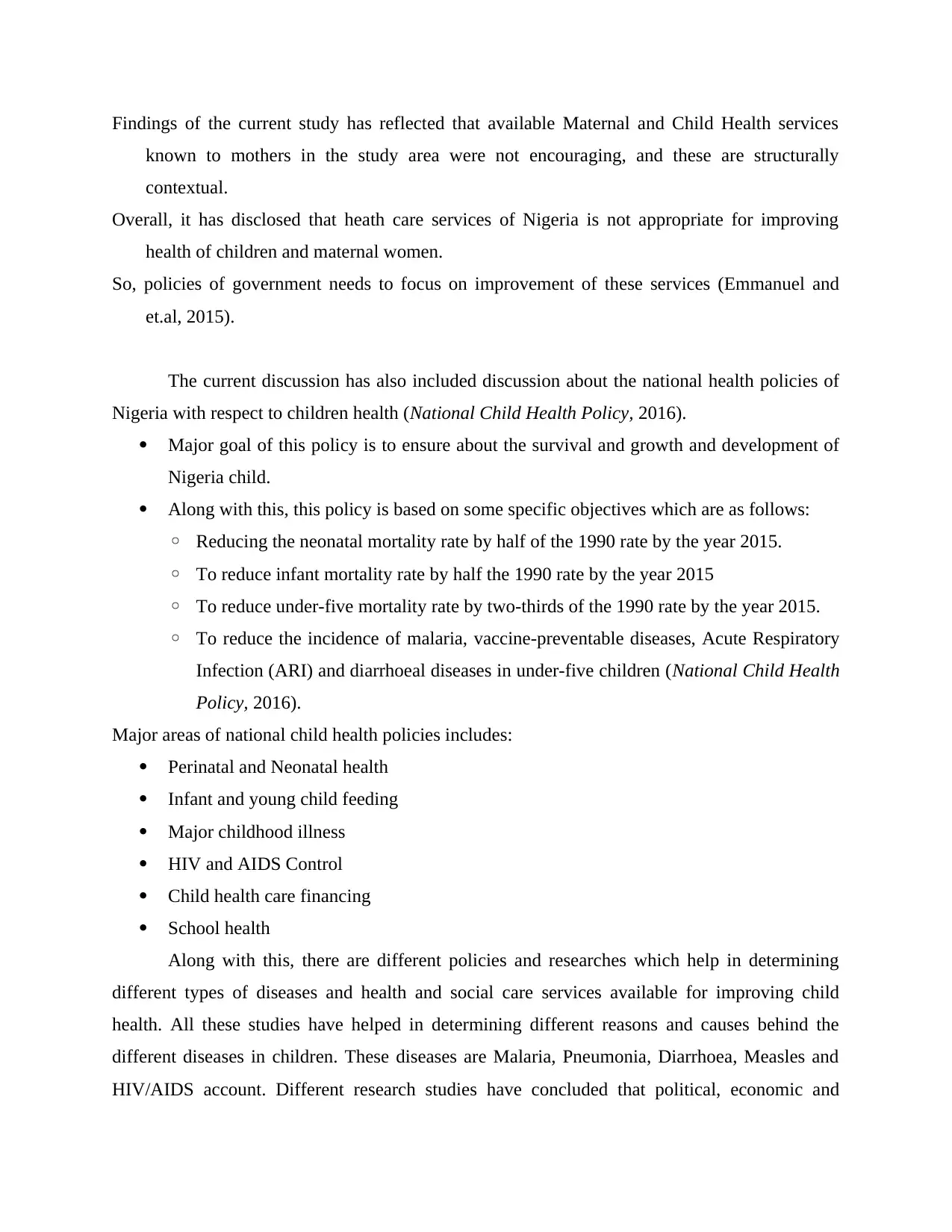
Findings of the current study has reflected that available Maternal and Child Health services
known to mothers in the study area were not encouraging, and these are structurally
contextual.
Overall, it has disclosed that heath care services of Nigeria is not appropriate for improving
health of children and maternal women.
So, policies of government needs to focus on improvement of these services (Emmanuel and
et.al, 2015).
The current discussion has also included discussion about the national health policies of
Nigeria with respect to children health (National Child Health Policy, 2016).
Major goal of this policy is to ensure about the survival and growth and development of
Nigeria child.
Along with this, this policy is based on some specific objectives which are as follows:
◦ Reducing the neonatal mortality rate by half of the 1990 rate by the year 2015.
◦ To reduce infant mortality rate by half the 1990 rate by the year 2015
◦ To reduce under-five mortality rate by two-thirds of the 1990 rate by the year 2015.
◦ To reduce the incidence of malaria, vaccine-preventable diseases, Acute Respiratory
Infection (ARI) and diarrhoeal diseases in under-five children (National Child Health
Policy, 2016).
Major areas of national child health policies includes:
Perinatal and Neonatal health
Infant and young child feeding
Major childhood illness
HIV and AIDS Control
Child health care financing
School health
Along with this, there are different policies and researches which help in determining
different types of diseases and health and social care services available for improving child
health. All these studies have helped in determining different reasons and causes behind the
different diseases in children. These diseases are Malaria, Pneumonia, Diarrhoea, Measles and
HIV/AIDS account. Different research studies have concluded that political, economic and
known to mothers in the study area were not encouraging, and these are structurally
contextual.
Overall, it has disclosed that heath care services of Nigeria is not appropriate for improving
health of children and maternal women.
So, policies of government needs to focus on improvement of these services (Emmanuel and
et.al, 2015).
The current discussion has also included discussion about the national health policies of
Nigeria with respect to children health (National Child Health Policy, 2016).
Major goal of this policy is to ensure about the survival and growth and development of
Nigeria child.
Along with this, this policy is based on some specific objectives which are as follows:
◦ Reducing the neonatal mortality rate by half of the 1990 rate by the year 2015.
◦ To reduce infant mortality rate by half the 1990 rate by the year 2015
◦ To reduce under-five mortality rate by two-thirds of the 1990 rate by the year 2015.
◦ To reduce the incidence of malaria, vaccine-preventable diseases, Acute Respiratory
Infection (ARI) and diarrhoeal diseases in under-five children (National Child Health
Policy, 2016).
Major areas of national child health policies includes:
Perinatal and Neonatal health
Infant and young child feeding
Major childhood illness
HIV and AIDS Control
Child health care financing
School health
Along with this, there are different policies and researches which help in determining
different types of diseases and health and social care services available for improving child
health. All these studies have helped in determining different reasons and causes behind the
different diseases in children. These diseases are Malaria, Pneumonia, Diarrhoea, Measles and
HIV/AIDS account. Different research studies have concluded that political, economic and
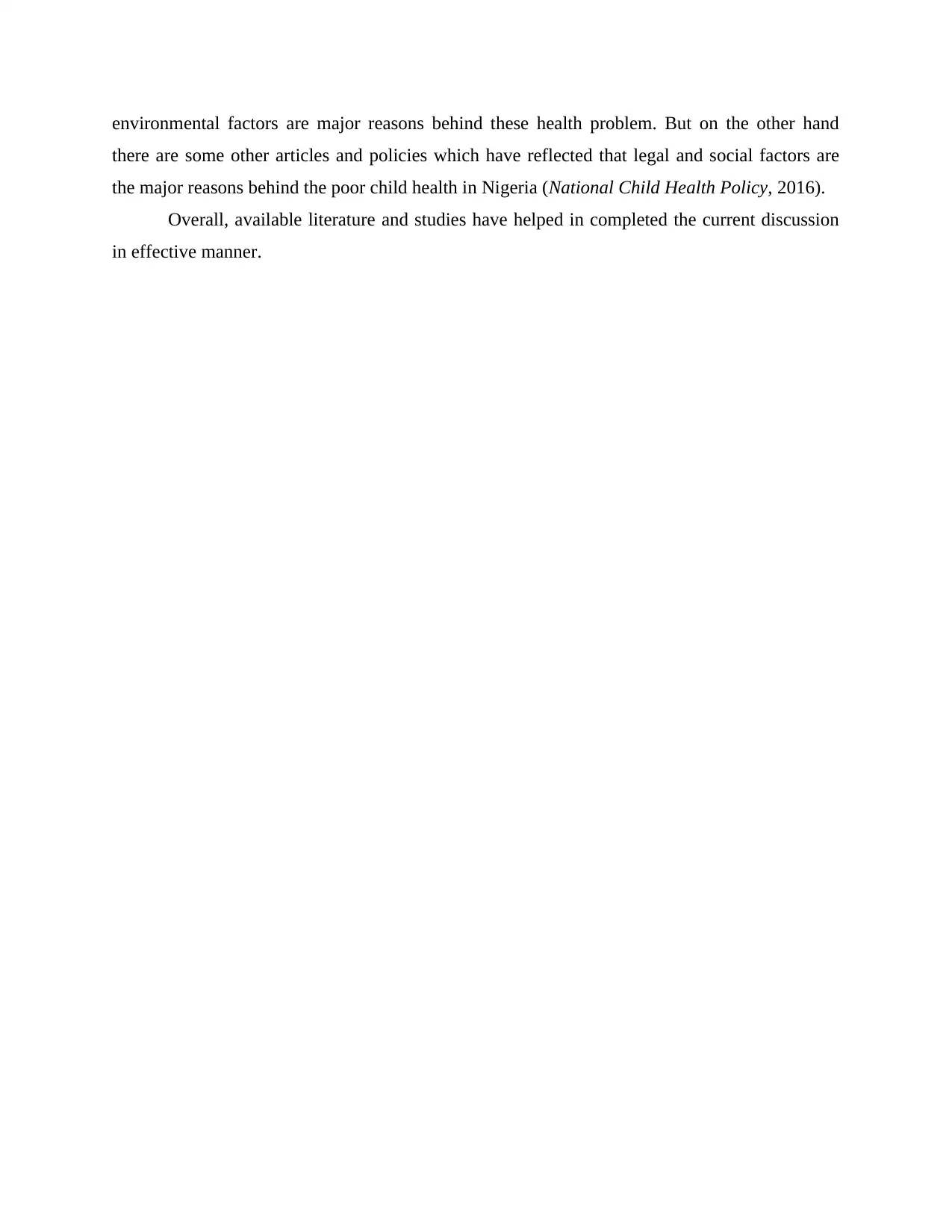
environmental factors are major reasons behind these health problem. But on the other hand
there are some other articles and policies which have reflected that legal and social factors are
the major reasons behind the poor child health in Nigeria (National Child Health Policy, 2016).
Overall, available literature and studies have helped in completed the current discussion
in effective manner.
there are some other articles and policies which have reflected that legal and social factors are
the major reasons behind the poor child health in Nigeria (National Child Health Policy, 2016).
Overall, available literature and studies have helped in completed the current discussion
in effective manner.
⊘ This is a preview!⊘
Do you want full access?
Subscribe today to unlock all pages.

Trusted by 1+ million students worldwide
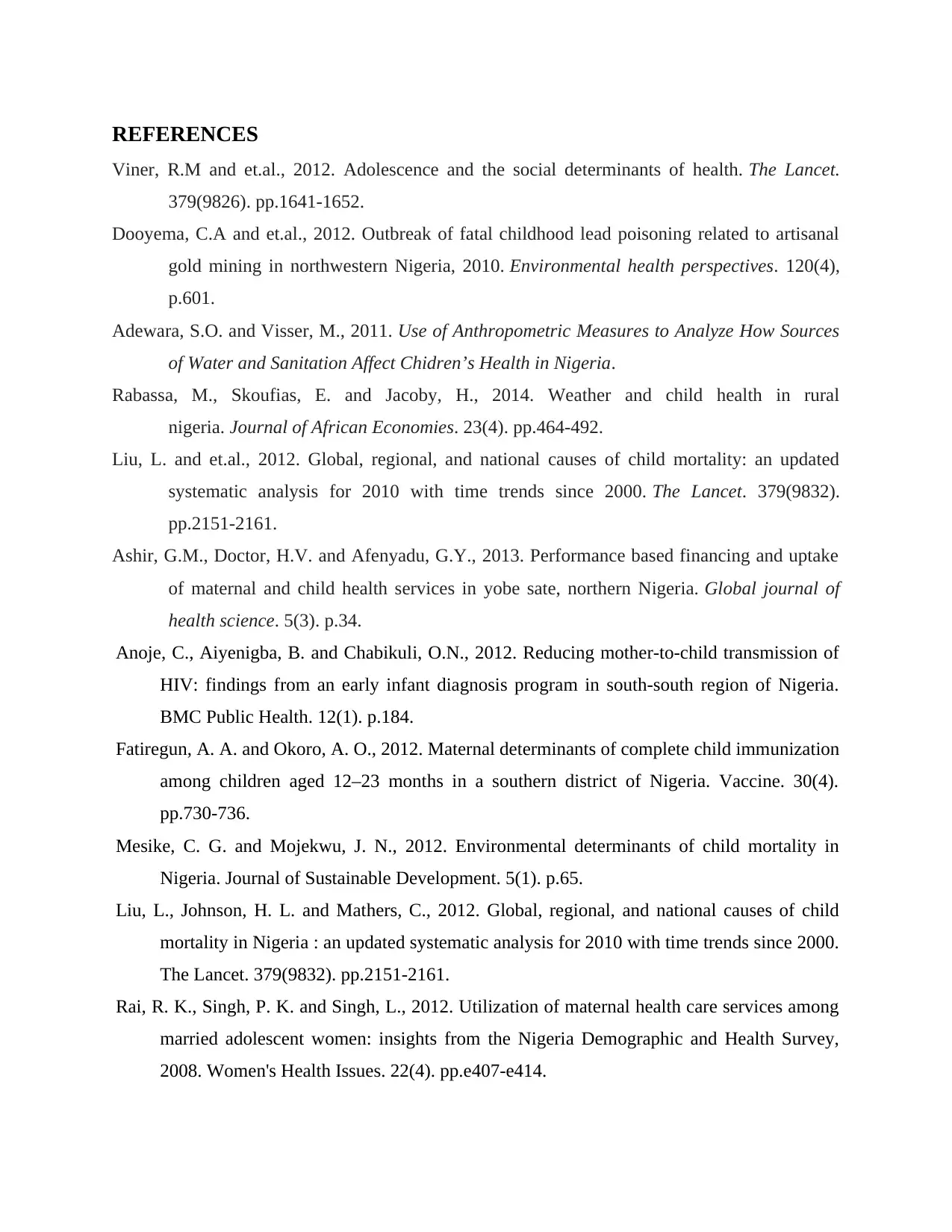
REFERENCES
Viner, R.M and et.al., 2012. Adolescence and the social determinants of health. The Lancet.
379(9826). pp.1641-1652.
Dooyema, C.A and et.al., 2012. Outbreak of fatal childhood lead poisoning related to artisanal
gold mining in northwestern Nigeria, 2010. Environmental health perspectives. 120(4),
p.601.
Adewara, S.O. and Visser, M., 2011. Use of Anthropometric Measures to Analyze How Sources
of Water and Sanitation Affect Chidren’s Health in Nigeria.
Rabassa, M., Skoufias, E. and Jacoby, H., 2014. Weather and child health in rural
nigeria. Journal of African Economies. 23(4). pp.464-492.
Liu, L. and et.al., 2012. Global, regional, and national causes of child mortality: an updated
systematic analysis for 2010 with time trends since 2000. The Lancet. 379(9832).
pp.2151-2161.
Ashir, G.M., Doctor, H.V. and Afenyadu, G.Y., 2013. Performance based financing and uptake
of maternal and child health services in yobe sate, northern Nigeria. Global journal of
health science. 5(3). p.34.
Anoje, C., Aiyenigba, B. and Chabikuli, O.N., 2012. Reducing mother-to-child transmission of
HIV: findings from an early infant diagnosis program in south-south region of Nigeria.
BMC Public Health. 12(1). p.184.
Fatiregun, A. A. and Okoro, A. O., 2012. Maternal determinants of complete child immunization
among children aged 12–23 months in a southern district of Nigeria. Vaccine. 30(4).
pp.730-736.
Mesike, C. G. and Mojekwu, J. N., 2012. Environmental determinants of child mortality in
Nigeria. Journal of Sustainable Development. 5(1). p.65.
Liu, L., Johnson, H. L. and Mathers, C., 2012. Global, regional, and national causes of child
mortality in Nigeria : an updated systematic analysis for 2010 with time trends since 2000.
The Lancet. 379(9832). pp.2151-2161.
Rai, R. K., Singh, P. K. and Singh, L., 2012. Utilization of maternal health care services among
married adolescent women: insights from the Nigeria Demographic and Health Survey,
2008. Women's Health Issues. 22(4). pp.e407-e414.
Viner, R.M and et.al., 2012. Adolescence and the social determinants of health. The Lancet.
379(9826). pp.1641-1652.
Dooyema, C.A and et.al., 2012. Outbreak of fatal childhood lead poisoning related to artisanal
gold mining in northwestern Nigeria, 2010. Environmental health perspectives. 120(4),
p.601.
Adewara, S.O. and Visser, M., 2011. Use of Anthropometric Measures to Analyze How Sources
of Water and Sanitation Affect Chidren’s Health in Nigeria.
Rabassa, M., Skoufias, E. and Jacoby, H., 2014. Weather and child health in rural
nigeria. Journal of African Economies. 23(4). pp.464-492.
Liu, L. and et.al., 2012. Global, regional, and national causes of child mortality: an updated
systematic analysis for 2010 with time trends since 2000. The Lancet. 379(9832).
pp.2151-2161.
Ashir, G.M., Doctor, H.V. and Afenyadu, G.Y., 2013. Performance based financing and uptake
of maternal and child health services in yobe sate, northern Nigeria. Global journal of
health science. 5(3). p.34.
Anoje, C., Aiyenigba, B. and Chabikuli, O.N., 2012. Reducing mother-to-child transmission of
HIV: findings from an early infant diagnosis program in south-south region of Nigeria.
BMC Public Health. 12(1). p.184.
Fatiregun, A. A. and Okoro, A. O., 2012. Maternal determinants of complete child immunization
among children aged 12–23 months in a southern district of Nigeria. Vaccine. 30(4).
pp.730-736.
Mesike, C. G. and Mojekwu, J. N., 2012. Environmental determinants of child mortality in
Nigeria. Journal of Sustainable Development. 5(1). p.65.
Liu, L., Johnson, H. L. and Mathers, C., 2012. Global, regional, and national causes of child
mortality in Nigeria : an updated systematic analysis for 2010 with time trends since 2000.
The Lancet. 379(9832). pp.2151-2161.
Rai, R. K., Singh, P. K. and Singh, L., 2012. Utilization of maternal health care services among
married adolescent women: insights from the Nigeria Demographic and Health Survey,
2008. Women's Health Issues. 22(4). pp.e407-e414.
Paraphrase This Document
Need a fresh take? Get an instant paraphrase of this document with our AI Paraphraser
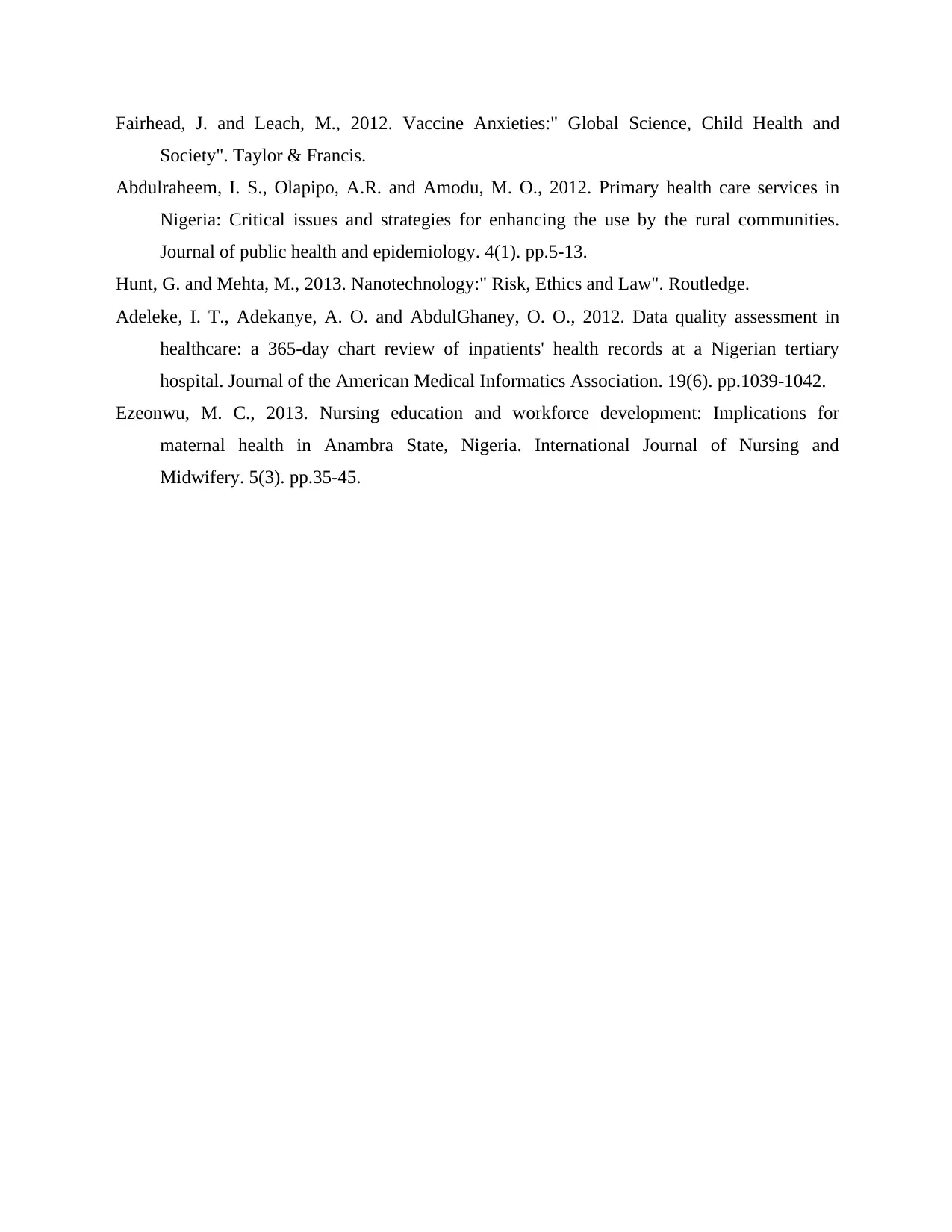
Fairhead, J. and Leach, M., 2012. Vaccine Anxieties:" Global Science, Child Health and
Society". Taylor & Francis.
Abdulraheem, I. S., Olapipo, A.R. and Amodu, M. O., 2012. Primary health care services in
Nigeria: Critical issues and strategies for enhancing the use by the rural communities.
Journal of public health and epidemiology. 4(1). pp.5-13.
Hunt, G. and Mehta, M., 2013. Nanotechnology:" Risk, Ethics and Law". Routledge.
Adeleke, I. T., Adekanye, A. O. and AbdulGhaney, O. O., 2012. Data quality assessment in
healthcare: a 365-day chart review of inpatients' health records at a Nigerian tertiary
hospital. Journal of the American Medical Informatics Association. 19(6). pp.1039-1042.
Ezeonwu, M. C., 2013. Nursing education and workforce development: Implications for
maternal health in Anambra State, Nigeria. International Journal of Nursing and
Midwifery. 5(3). pp.35-45.
Society". Taylor & Francis.
Abdulraheem, I. S., Olapipo, A.R. and Amodu, M. O., 2012. Primary health care services in
Nigeria: Critical issues and strategies for enhancing the use by the rural communities.
Journal of public health and epidemiology. 4(1). pp.5-13.
Hunt, G. and Mehta, M., 2013. Nanotechnology:" Risk, Ethics and Law". Routledge.
Adeleke, I. T., Adekanye, A. O. and AbdulGhaney, O. O., 2012. Data quality assessment in
healthcare: a 365-day chart review of inpatients' health records at a Nigerian tertiary
hospital. Journal of the American Medical Informatics Association. 19(6). pp.1039-1042.
Ezeonwu, M. C., 2013. Nursing education and workforce development: Implications for
maternal health in Anambra State, Nigeria. International Journal of Nursing and
Midwifery. 5(3). pp.35-45.
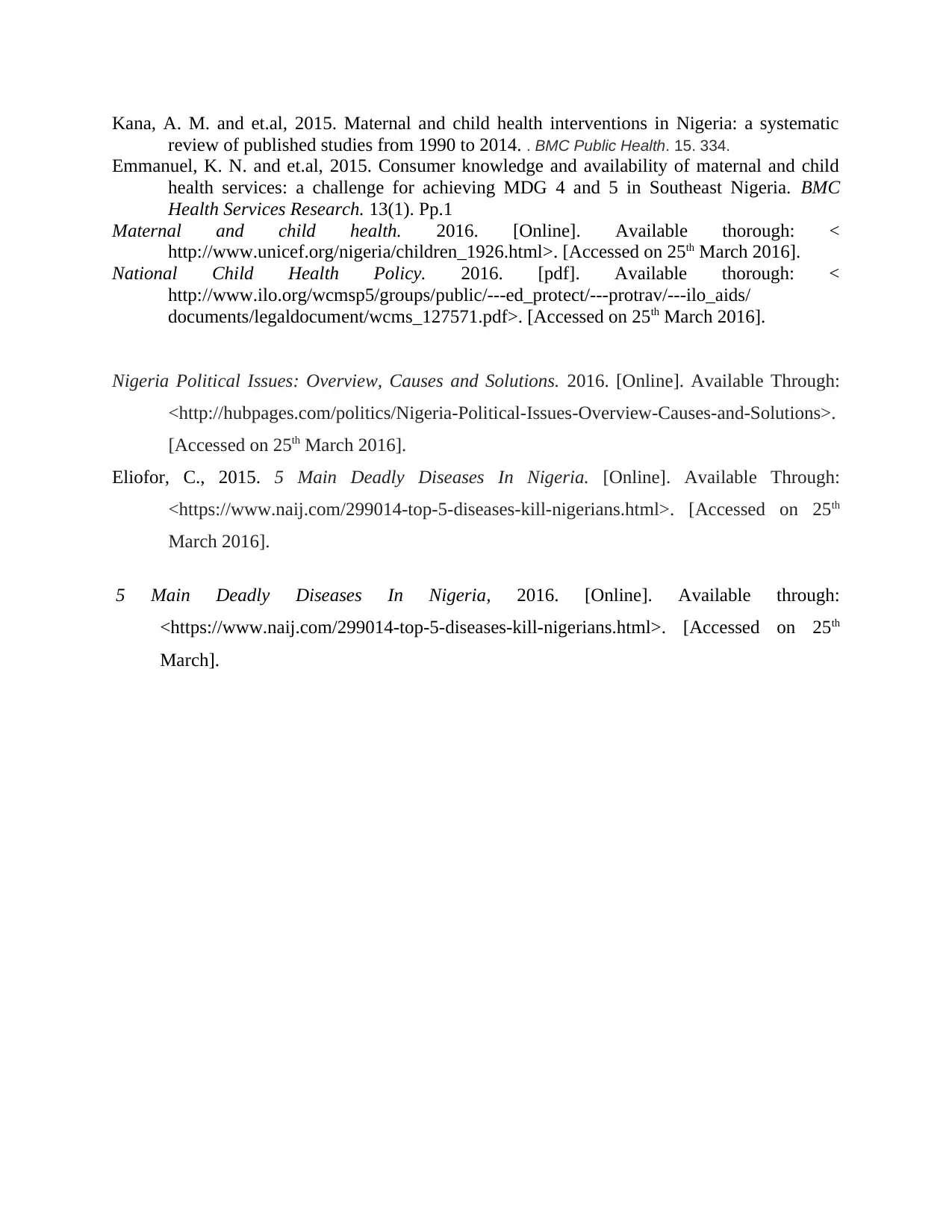
Kana, A. M. and et.al, 2015. Maternal and child health interventions in Nigeria: a systematic
review of published studies from 1990 to 2014. . BMC Public Health. 15. 334.
Emmanuel, K. N. and et.al, 2015. Consumer knowledge and availability of maternal and child
health services: a challenge for achieving MDG 4 and 5 in Southeast Nigeria. BMC
Health Services Research. 13(1). Pp.1
Maternal and child health. 2016. [Online]. Available thorough: <
http://www.unicef.org/nigeria/children_1926.html>. [Accessed on 25th March 2016].
National Child Health Policy. 2016. [pdf]. Available thorough: <
http://www.ilo.org/wcmsp5/groups/public/---ed_protect/---protrav/---ilo_aids/
documents/legaldocument/wcms_127571.pdf>. [Accessed on 25th March 2016].
Nigeria Political Issues: Overview, Causes and Solutions. 2016. [Online]. Available Through:
<http://hubpages.com/politics/Nigeria-Political-Issues-Overview-Causes-and-Solutions>.
[Accessed on 25th March 2016].
Eliofor, C., 2015. 5 Main Deadly Diseases In Nigeria. [Online]. Available Through:
<https://www.naij.com/299014-top-5-diseases-kill-nigerians.html>. [Accessed on 25th
March 2016].
5 Main Deadly Diseases In Nigeria, 2016. [Online]. Available through:
<https://www.naij.com/299014-top-5-diseases-kill-nigerians.html>. [Accessed on 25th
March].
review of published studies from 1990 to 2014. . BMC Public Health. 15. 334.
Emmanuel, K. N. and et.al, 2015. Consumer knowledge and availability of maternal and child
health services: a challenge for achieving MDG 4 and 5 in Southeast Nigeria. BMC
Health Services Research. 13(1). Pp.1
Maternal and child health. 2016. [Online]. Available thorough: <
http://www.unicef.org/nigeria/children_1926.html>. [Accessed on 25th March 2016].
National Child Health Policy. 2016. [pdf]. Available thorough: <
http://www.ilo.org/wcmsp5/groups/public/---ed_protect/---protrav/---ilo_aids/
documents/legaldocument/wcms_127571.pdf>. [Accessed on 25th March 2016].
Nigeria Political Issues: Overview, Causes and Solutions. 2016. [Online]. Available Through:
<http://hubpages.com/politics/Nigeria-Political-Issues-Overview-Causes-and-Solutions>.
[Accessed on 25th March 2016].
Eliofor, C., 2015. 5 Main Deadly Diseases In Nigeria. [Online]. Available Through:
<https://www.naij.com/299014-top-5-diseases-kill-nigerians.html>. [Accessed on 25th
March 2016].
5 Main Deadly Diseases In Nigeria, 2016. [Online]. Available through:
<https://www.naij.com/299014-top-5-diseases-kill-nigerians.html>. [Accessed on 25th
March].
⊘ This is a preview!⊘
Do you want full access?
Subscribe today to unlock all pages.

Trusted by 1+ million students worldwide
1 out of 13
Related Documents
Your All-in-One AI-Powered Toolkit for Academic Success.
+13062052269
info@desklib.com
Available 24*7 on WhatsApp / Email
![[object Object]](/_next/static/media/star-bottom.7253800d.svg)
Unlock your academic potential
Copyright © 2020–2025 A2Z Services. All Rights Reserved. Developed and managed by ZUCOL.





